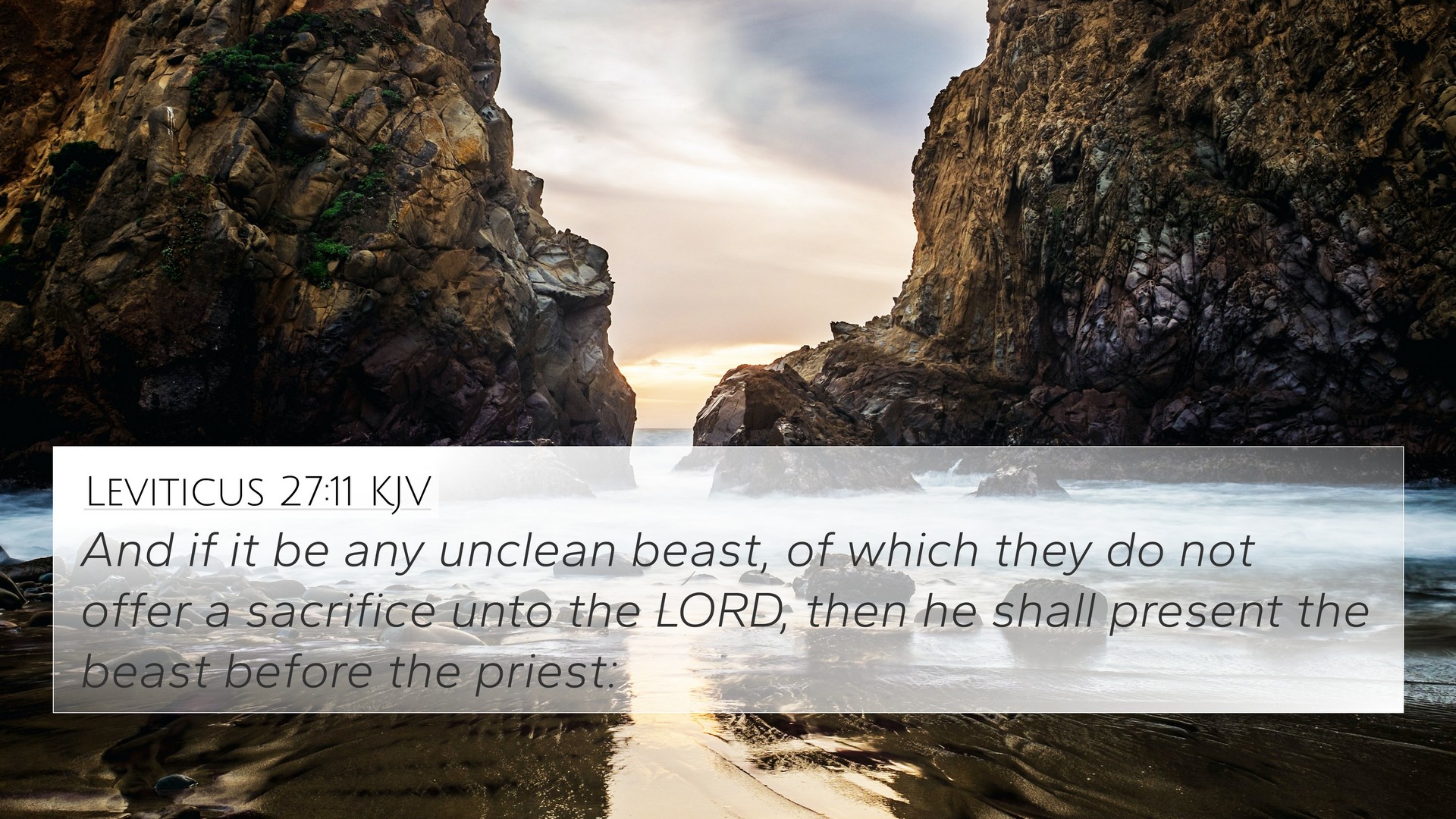Understanding Leviticus 27:11
Leviticus 27:11 states: "And if it be any unclean beast, of which they do not offer a sacrifice unto the LORD, then he shall present the beast before the priest." This verse is part of the Mosaic Law concerning vows related to dedicating animals to the Lord, highlighting themes of holiness, purity, and sacrificial offerings.
Context and Themes
The context of Leviticus is the laws given to the Israelites regarding how to live as God's chosen people. This chapter specifically deals with the valuation of people and animals dedicated to the Lord, which was part of a system for managing offerings and sacrifices.
Key Themes:
- Holiness: The offering of clean versus unclean animals underscores the concept of purity in worship.
- Dedication: Vows and pledges signify a commitment to God and His covenant.
- Value Assessment: The verse reflects the importance of measuring worth in relation to sacred obligations.
Bible Verse Cross-References
Leviticus 27:11 connects with several other scripture passages that further illuminate its meaning:
- Exodus 12:5: Refers to the sacrifice of lambs without blemish—emphasizing the purity required in sacrificial offerings.
- Deuteronomy 15:21: Discusses animals that are to be sacrificed and the importance of offering without defect.
- Isaiah 53:7: Describes the sacrificial nature of the Messiah, paralleling the themes of unblemished offerings.
- 1 Peter 1:19: Relates to the theme of Christ as the lamb without blemish, linking to Leviticus's focus on holiness.
- Hebrews 9:13-14: Highlights the significance of blood sacrifices for purification, resonating with the concepts in Leviticus.
- Mark 7:19: Expounds on the nature of cleanliness and uncleanliness, a central idea in Leviticus.
- Romans 12:1: Calls believers to present themselves as living sacrifices, echoing the spirit of dedication found in Leviticus.
Interpretations from Public Domain Commentaries
Insights from well-known commentators help us dive deeper into the meaning of Leviticus 27:11.
Matthew Henry's Commentary
Matthew Henry emphasizes that this law serves to maintain the distinction between clean and unclean animals, with clear guidelines for how Israelites are to manage their offerings. He notes that the presence of the unclean beast was a reminder of the necessity for purity in worship and service to God. Henry illustrates that God's standards are high and replacements for valuing what is unclean with what is clean symbolize the importance of holiness in divine service.
Albert Barnes' Notes
Albert Barnes discusses the strict regulations concerning offerings, explaining that the presented unclean animals do not represent a suitable sacrifice to God. He interprets this verse as indicative of the larger framework of the sacrificial system, which represents the profound need for atonement and dedication to God. Barnes highlights that the priest plays a crucial role in discerning these offerings, connecting it to the priestly work of Jesus the Christ as the ultimate mediator.
Adam Clarke's Commentary
Adam Clarke notes that this specific provision pertains to the ritual of presenting an animal when a person vows to dedicate one to God yet presents one that is considered unclean. Clarke points out that the intent behind such laws was not merely punitive but aimed to instruct the community and draw them nearer to the divine, stressing that inappropriate sacrifices illustrate deeper spiritual implications. He connects this to broader themes of repentance, right worship, and the necessity of proper observance of God's commandments.
How This Verse Relates to Broader Biblical Narrative
The themes of Leviticus 27:11 resonate throughout the scriptures regarding offerings, holiness, and the nature of acceptable worship. The verse connects with the overarching narrative of sacrifice leading to redemption, culminating in the New Testament's portrayal of Jesus and His sacrifice.
Applying Cross-Referencing Techniques
To grasp the full implications of Leviticus 27:11, Bible scholars often utilize various tools for Bible cross-referencing. A Bible concordance serves as a crucial resource for identifying where particular themes or words appear throughout the biblical text, leading to a deeper understanding of the intricate connections between different books of the Bible. Cross-referencing can also help elucidate how particular verses converse and relate to one another across both the Old and New Testaments.
Practical Steps for Cross-Referencing
- Identify key terms in the verse, such as "unclean beast" and "priest."
- Use a Bible cross-reference guide to find related verses that elaborate on these concepts.
- Engage in a cross-reference Bible study session focusing on both the Old Testament laws and New Testament teachings.
- Utilize a Bible reference resource to note thematic patterns connecting Leviticus with the messages of Christ.
- Document and compare findings across various books to appreciate the full narrative context.
Conclusion
Leviticus 27:11 invites readers to explore deeper themes of purity, sacrifice, and dedication that are fundamental within the biblical narrative. Through proper interpretation and cross-referencing, one can appreciate the inseparable connections between the laws given to Israel and the work of Christ in the New Testament. Understanding these links not only enriches one’s personal faith journey but also provides valuable insights for teaching and sharing the gospel with others.
Further Study Suggestions
For those interested in diving deeper into the connections between Bible verses, consider the following:
- Engage in a comparative Bible verse analysis to identify parallels between the Old and New Testaments.
- Explore thematic Bible verse connections that underscore the continuity of God’s redemptive plan throughout history.
- Participate in a cross-referencing Bible study group to discuss insights gained from collaborative studies of connecting verses.




